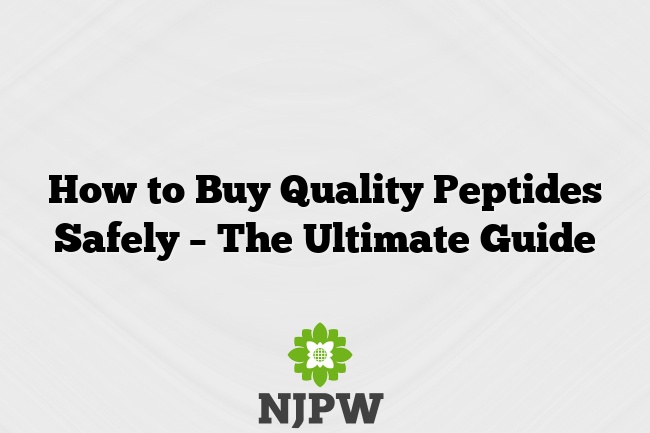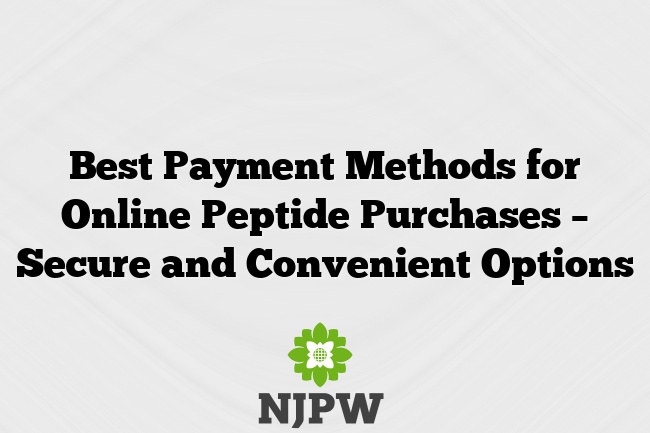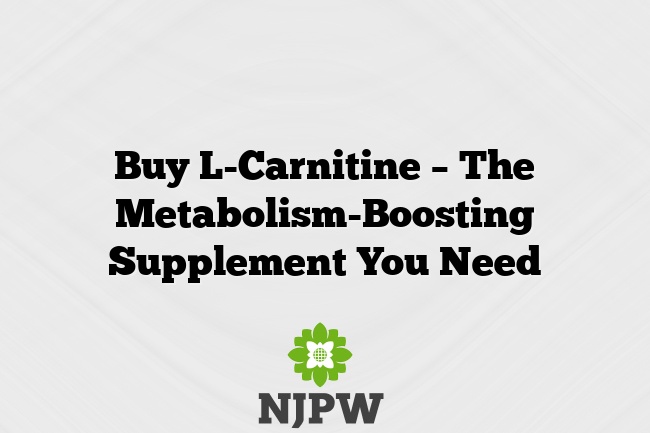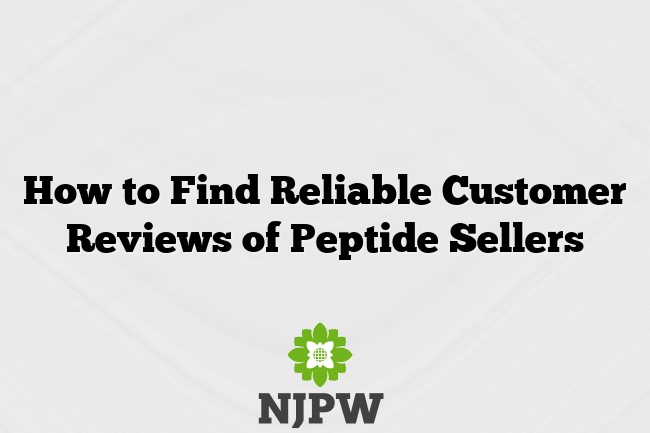How to Buy Quality Peptides Safely – The Ultimate Guide

Peptides have become increasingly popular in recent years, offering a wide range of potential benefits for those seeking to optimize their health and performance. Whether you’re an athlete looking to enhance recovery, a researcher exploring the latest advancements in cellular regeneration, or someone simply interested in the science of nutrition and supplementation, understanding how to safely purchase high-quality peptides is crucial.
| Key Considerations When Buying Peptides | Why It Matters |
|---|---|
| Peptide Purity | Ensuring the peptides you purchase are of the highest purity is essential to maximizing their effectiveness and minimizing the risk of adverse effects. |
| Peptide Potency | The potency of a peptide directly impacts its ability to elicit the desired physiological response, so it’s important to verify the potency of any peptides you purchase. |
| Peptide Legality | Navigating the legal landscape surrounding peptides is crucial to avoid potential issues, as regulations can vary significantly depending on your location and intended use. |
In this comprehensive guide, we’ll explore the key considerations and best practices for safely purchasing high-quality peptides, empowering you to make informed decisions and maximize the potential benefits of these remarkable compounds.
What are Peptides?
Peptides are short chains of amino acids that play a crucial role in a wide range of biological processes within the human body. They are formed when two or more amino acids are linked together, and they can range in size from just a few amino acids to larger, more complex structures. Peptides are involved in everything from hormone regulation and immune function to muscle growth and recovery.
MK-677, for example, is a popular peptide that works by stimulating the ghrelin receptor, leading to increased production of growth hormone and insulin-like growth factor 1 (IGF-1). This can result in enhanced muscle development, improved recovery, and a host of other potential benefits.
Peptides are often used in research, as well as by athletes and health-conscious individuals, to support various aspects of health and performance. However, it’s crucial to understand the importance of purchasing high-quality peptides from reputable suppliers to ensure safety, purity, and potency.
Identifying Reliable Peptide Suppliers
When it comes to purchasing peptides, the source you choose can make all the difference. Identifying reliable and trustworthy suppliers is essential to ensuring you receive genuine, high-quality compounds that are free from contaminants or adulterants.
One of the key factors to consider when evaluating potential peptide suppliers is their reputation and track record. Look for suppliers with a long history of providing quality products and excellent customer service. Check online reviews, industry forums, and trusted third-party sources to gauge the supplier’s reputation and reliability.
Additionally, it’s important to verify that the supplier is compliant with all relevant peptide regulations and has the necessary licenses and certifications to operate legally. This helps to ensure that the peptides you purchase are not only genuine but also produced and handled in a safe and responsible manner.
Another crucial aspect to consider is the supplier’s testing and quality control protocols. Reputable peptide suppliers should be able to provide detailed lab testing results for their products, demonstrating the purity, potency, and identity of the compounds they sell. This level of transparency and accountability is essential for ensuring the safety and efficacy of the peptides you purchase.
Evaluating Peptide Purity and Potency
When it comes to purchasing peptides, the purity and potency of the compounds are of paramount importance. Impurities or inconsistencies in the manufacturing process can lead to reduced effectiveness, potential side effects, and even serious health risks.
To ensure you’re getting the highest-quality peptides, it’s crucial to carefully evaluate the purity and potency of the products you’re considering. This typically involves reviewing lab testing results provided by the supplier, which should detail the percentage of the active ingredient, as well as the presence and levels of any potential contaminants.
Look for peptides that have a purity level of at least 95%, as this indicates that the compound has been produced and purified to a high standard. Anything less than 95% purity may not be suitable for use, as it could contain impurities that could compromise the safety and effectiveness of the product.
In addition to purity, the potency of the peptide is also a critical factor to consider. Potency refers to the strength or concentration of the active ingredient, and it can have a significant impact on the compound’s ability to elicit the desired physiological response. Reputable suppliers should be able to provide detailed information on the potency of their peptide products, allowing you to make an informed decision about the appropriate dosage and administration.
By carefully evaluating the purity and potency of the peptides you purchase, you can ensure that you’re getting high-quality compounds that are safe, effective, and capable of delivering the benefits you’re seeking.
Understanding Peptide Legality and Regulations
The legal landscape surrounding peptides can be complex and often varies depending on your location and intended use. It’s essential to have a thorough understanding of the relevant peptide regulations in your area to ensure that you’re purchasing and using these compounds in a compliant and responsible manner.
In many countries, peptides are classified as research chemicals and are subject to specific laws and regulations governing their sale, possession, and use. These regulations may include requirements for licensing, labeling, and record-keeping, as well as restrictions on the types of peptides that can be purchased and the purposes for which they can be used.
It’s important to note that the legal status of peptides can also be influenced by factors such as the intended use (e.g., personal use vs. research), the specific peptide compound, and the source of the product. For example, some peptides may be considered controlled substances in certain jurisdictions, while others may be more readily available for purchase.
To ensure compliance with all relevant peptide regulations, it’s crucial to thoroughly research the laws and requirements in your local area before making any purchases. This may involve consulting with healthcare professionals, regulatory agencies, or legal experts to ensure that you’re fully informed and operating within the bounds of the law.
By understanding the legal landscape surrounding peptides, you can make informed decisions about where and how to purchase these compounds, minimizing the risk of potential legal issues or consequences.
Avoiding Counterfeit or Contaminated Compounds
One of the biggest challenges when purchasing peptides is the risk of encountering counterfeit or contaminated products. The proliferation of unscrupulous suppliers and the ease of online purchasing have made it increasingly difficult to ensure the authenticity and safety of the peptides you’re buying.
Counterfeit peptides can be extremely dangerous, as they may contain unknown or potentially harmful substances that can pose serious health risks. These products are often manufactured in substandard facilities without proper quality control measures, and they may not even contain the active ingredient they claim to.
To mitigate the risk of purchasing counterfeit or contaminated peptides, it’s essential to exercise caution and diligence when selecting a supplier. Look for reputable vendors with a proven track record of providing high-quality, genuine products. Verify that the supplier is compliant with all relevant peptide regulations and can provide detailed lab testing results to confirm the purity and potency of their compounds.
Additionally, be wary of peptides that are significantly cheaper than the industry standard, as this can be a red flag for potential counterfeits or low-quality products. If a deal seems too good to be true, it’s generally best to avoid it.
By taking the time to thoroughly research and vet your peptide suppliers, you can significantly reduce the risk of encountering counterfeit or contaminated compounds, ensuring that the products you purchase are safe, effective, and of the highest quality.
Key Benefits of Using High-Quality Peptides
When it comes to the potential benefits of using peptides, the list is extensive and continues to grow as research in this field advances. From enhanced muscle growth and recovery to improved cognitive function and anti-aging effects, high-quality peptides can offer a wide range of advantages for those looking to optimize their health and performance.
One of the primary benefits of using peptides is their ability to support muscle development and recovery. Compounds like MK-677 and IGF-1 can help to stimulate the production of growth hormone and other anabolic factors, leading to increased muscle mass, improved strength, and faster recovery from exercise.
Peptides can also play a crucial role in supporting the body’s natural healing and regenerative processes. Certain peptide compounds have been shown to enhance cellular repair, reduce inflammation, and even promote the growth of new blood vessels, making them valuable tools for those seeking to optimize their overall health and well-being.
Additionally, peptides have been explored for their potential cognitive benefits, with some research suggesting that they may enhance memory, focus, and overall brain function. This makes them of particular interest to individuals looking to support their mental performance and cognitive longevity.
By incorporating high-quality peptides into a comprehensive health and wellness regimen, individuals can unlock a wide range of potential benefits that can positively impact various aspects of their life, from physical performance to mental acuity and overall quality of life.
Proper Storage and Handling Techniques
Ensuring the proper storage and handling of peptides is crucial to maintaining their integrity, potency, and safety. Improper storage or handling can lead to degradation, contamination, or even the formation of harmful byproducts, which can compromise the effectiveness and safety of the compounds.
When it comes to peptide storage, it’s essential to keep the compounds in a cool, dry, and dark environment. Exposure to heat, light, and moisture can accelerate the breakdown of peptides, reducing their potency and effectiveness. Many peptides are best stored in a refrigerator or freezer, depending on the specific product and manufacturer’s recommendations.
It’s also important to handle peptides with care, using appropriate personal protective equipment (PPE) such as gloves and goggles to minimize the risk of exposure or contamination. Avoid touching the compounds directly, and always use clean, sterile equipment and surfaces when reconstituting or administering the peptides.
Proper labeling and record-keeping are also essential when it comes to peptide storage and handling. Ensure that each container is clearly labeled with the peptide name, concentration, and expiration date, and maintain detailed records of when and how the compounds were received, stored, and used.
By following these best practices for peptide storage and handling, you can help to ensure the safety, potency, and efficacy of the compounds you’re using, maximizing the potential benefits while minimizing the risks.
Dosage Guidelines and Administration Methods
When it comes to using peptides, the appropriate dosage and administration method can vary depending on the specific compound, the individual’s goals, and various other factors. It’s crucial to carefully follow the guidance provided by the supplier or healthcare professional to ensure the safe and effective use of these compounds.
Proper dosing of peptides is essential to achieving the desired outcomes. Factors such as body weight, age, and individual sensitivity can all play a role in determining the optimal dosage. It’s generally recommended to start with a lower dose and gradually increase it over time, closely monitoring for any adverse effects or changes in response.
Peptides can be administered through a variety of methods, including subcutaneous injection, intramuscular injection, and oral administration (in the case of certain peptide-based supplements). The specific administration method will depend on the peptide compound, the intended use, and the individual’s preferences and comfort level.
Regardless of the administration method, it’s crucial to follow proper aseptic techniques to minimize the risk of infection or contamination. This may include using sterile syringes, alcohol swabs, and other necessary equipment, as well as following proper injection or ingestion protocols.
It’s important to note that the use of peptides should always be done under the guidance of a healthcare professional, who can provide personalized dosage recommendations and monitor the individual’s response to ensure the safe and effective use of these compounds.
Stacking and Cycling Peptides Safely
For those seeking to maximize the benefits of peptides, the concept of “stacking” and “cycling” can be a valuable strategy. Stacking involves the use of multiple peptide compounds simultaneously, while cycling refers to the periodic rotation or alternation of different peptides over time.
When done correctly, stacking and cycling peptides can help to enhance the desired effects and potentially amplify the overall benefits. However, it’s crucial to approach these practices with caution and diligence, as improper use can increase the risk of adverse effects or interactions.
When stacking peptides, it’s essential to carefully consider the compatibility and potential synergies between the compounds. Certain peptides may work well together, while others may have antagonistic effects or lead to unwanted side effects. It’s recommended to start with a single peptide and gradually introduce additional compounds, closely monitoring the body’s response and making adjustments as needed.
Cycling peptides can also be an effective strategy, allowing the body to rest and recover between periods of use. This can help to prevent desensitization or diminishing returns, as well as mitigate the risk of potential side effects. The specific cycling protocol will depend on the peptide compounds, the individual’s goals, and the guidance of a healthcare professional.
Regardless of whether you’re stacking or cycling peptides, it’s crucial to maintain a comprehensive understanding of the compounds, their interactions, and the potential risks involved. Consulting with a healthcare professional who is knowledgeable about peptide research and the latest scientific evidence can help to ensure the safe and effective use of these compounds.
Maximizing the Effectiveness of Peptide Supplements
To maximize the effectiveness of peptide supplements, it’s important to consider a multifaceted approach that addresses various aspects of health and wellness. While the peptides themselves can provide significant benefits, their effectiveness can be amplified when combined with a well-rounded lifestyle and supplementation regimen.
One key factor in maximizing the effectiveness of peptide supplements is ensuring optimal overall health and nutrition. This may involve incorporating a balanced diet rich in whole, nutrient-dense foods, as well as addressing any underlying deficiencies or imbalances through targeted supplementation.
Additionally, maintaining a consistent exercise routine that incorporates both resistance training and cardiovascular activities can help to optimize the body’s response to peptide supplements. The synergistic effects of exercise and targeted supplementation can lead to enhanced muscle growth, improved recovery, and better overall physical performance.
Adequate rest and stress management are also crucial for maximizing the effectiveness of peptide supplements. Chronic stress and sleep deprivation can interfere with the body’s natural processes and diminish the potential benefits of these compounds. Prioritizing stress-reducing activities, such as meditation, yoga, or mindfulness practices, and ensuring sufficient quality sleep can help to create an optimal environment for the peptides to exert their full effects.
By adopting a comprehensive approach that addresses various aspects of health and wellness, individuals can unlock the full potential of peptide supplements and achieve their desired outcomes, whether that’s improved physical performance, enhanced recovery, or overall well-being.
Conclusion
Navigating the world of peptides can be a complex and nuanced endeavor, but with the right knowledge and approach, it can also be a highly rewarding one. By understanding the key considerations for safely purchasing high-quality peptides, evaluating their purity and potency, and incorporating them into a well-rounded health and wellness regimen, individuals can unlock a wide range of potential benefits.
Remember, the quality and safety of the peptides you purchase are paramount, so be sure to thoroughly research and vet your suppliers, and always consult with a healthcare professional before incorporating these compounds into your routine. With the right information and guidance, you can confidently explore the transformative power of peptides and take your health and performance to new heights.
Frequently Asked Questions
What are the most common types of peptides?
Some of the most commonly used peptides include growth hormone-releasing peptides (GHRPs) like






